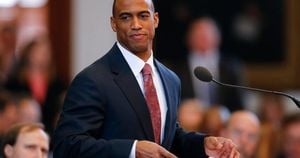Donald Trump is making headlines once again, having secured victory for the second time in the 2024 presidential elections. Scheduled to take office next January, his return to the White House raises many discussions around what his next term will entail. Some may see this as the continuation of his controversial policies, especially as members of the right-wing think tank, the Heritage Foundation, figure prominently among his nominees for key cabinet positions. A closer look at these developments reveals important insights about the Trump administration's agenda and the political dynamics at play.
While Trump’s victory brought jubilation among his supporters, it is hard to ignore the nuances behind the election statistics. His claim of an overwhelming win boasting 312 electoral votes seems impressive on the surface but masks significant shortcomings. Trump garnered only 49.9% of the popular vote. This narrow margin undoubtedly complicates his mandate for sweeping changes. How can such figures translate to substantial political power? The apparent disconnect between the electoral successes and public sentiment might position Trump as a divided leader, one whose policies could face significant hurdles if viewed unenthusiastically by many within the electorate.
His detractors are already vocalizing concerns as his administration gears up. The discussions surrounding the "America First" agenda signal the resurgence of the so-called deep state, as critics perceive Trump's approach as seeking to restore rights and powers to the executive, potentially at the expense of civil service stature and institutional integrity. Critics and voters alike are wary, knowing how Trump's previous term entwined governance with personal interests and public distrust.
At the core of discussions about the Trump administration are his cabinet nominations, widely viewed through the lens of Project 2025, which aims to reshape the American political and bureaucratic structure. Trump has repeatedly disavowed any ties to the project—an intriguing tactic, considering several key nominees have been closely identified as architects behind it. For example, his nomination of Russell Vought for the role of Director of the Office of Management and Budget (OMB) sparked debate, as Vought is known for his association with Project 2025’s highly technical blueprint. This document appeals to extreme conservative values, proposing to augment the executive branch's authority and actively lessen the influence of career civil servants.
"Russ has spent many years working in Public Policy and is known for aggressive cost-cutting, which aligns with our America First Agenda across all Agencies," Trump stated, emphasizing how Vought would assist him to dismantle the so-called deep state. Nevertheless, Vought's archived commentary on the necessity to diminish the power of the federal workforce adds fuel to the fire. His connection to Project 2025 has put Trump on the defensive, as with many other cabinet picks, including Tom Homan, his "border czar," who has plans for mass deportations.
This growing assembly of controversial figures echoes through Trump’s inner circle. Names like Brendan Carr, who authored the Project 2025 chapter on the Federal Communications Commission (FCC), have also entered positions of potential influence under Trump's presidency. Carr’s leadership of the FCC could put policies regulating media communications aligned with Trump's bold agenda at risk.
Even Trump defenders are expressing trepidation about Trump's self-identified ignorance of the very architecture of Project 2025. "I won’t take a topic from them, I won’t touch them," claimed Howard Lutnick, nominee for secretary of commerce, referencing the Heritage Foundation's proposals—showcasing just how complex the relationship is between Trump and his endorsement of these radical ideas. Yet, upon his victorious return, it bears questions: is there fragmentation within the party, or are some factions uniting behind bold changes? While some party members champion appointments like Vought's, others warn of remote control from far-right organizations.
Trump's return has emerged amid feelings of commotion, not just evident within his party, but also echoed by the public at large. Political surveys reveal the electorate has mixed feelings about Trump's honesty. For example, recent polls indicate challenger Kamala Harris—a divisive figure herself—holds more favorability when it turns to personal integrity over Trump. Yet, concerns about inflation, immigration, and economic stability seem to help Trump's platform transcend issues around his dishonesty.
Historical evidence suggests how misinformation might play out to Trump’s advantage. Many of his supporters consume media from isolated sources, making many dismissive toward glaring discrepancies. They view his hyperbole as entertainment more than egregious offenses—a concerning reality as such framing can lead to acceptance of twisted narratives. Despite already observing significant electoral wins, experts warn it's not wise for Democrats to rely on traditional media to confront Trump’s falsehoods. Instead, they may need to devise fresh strategies to confront and counteract the narratives he continues to propagate.
Interestingly, some severe critiques of Trump's record evoke nostalgia for the truthful politics of earlier eras, presenting clear questions about the enduring value of authenticity within public service. Kevin Madden, Republican strategist, argued, “He's unique with capabilities,” acknowledging Trump's unmatched grasp on media narratives, implying concerned electoral realities might matter less than the appearance of power and charisma. Does conventional truth even matter to the voter? Do they believe the passion he evokes outweighs the veracity of his claims?
This constant push-pull leads us to reevaluate how American governance might change should Trump succeed again. Experts strongly suggest accountability among political figures remains non-negotiable. Yet, as the data reveals, certain voters potentially value showmanship and charisma over disclosing reality, leaving the integrity of governance at risk. Can voters navigate away from charismatic deception, even as it increases on the national stage?
While many commentators focus primarily on what Project 2025 intends to instigate—increased accountability among civil servants—this begs broader questions about how far such endeavors might diverge from democratic norms and practices. While Vought's role will certainly see push-forward efforts targeting the perceived excesses of the operational state and bureaucracy, will backlash from those mounting voices embolden or erode trust from within the administration? We are entering uncertain waters as anticipation mounts around Trump's next moves.
Consider the broader structural changes poised against perceived failures on the part of traditional bureaucratic norms. If Trump's incessant narrative built upon misinformation effectively solidifies voter loyalties, where does this drop down to? Perceptions of political reality might move so far away from conventional norms, demanding emergent language and authority irrespective of standard truth. At his rally, Trump noted how he might engage with efforts but lacked insight from the moving apparatus surrounding his administration. This should force observers to keep vigilant eyes on whether Trump will utilize conventional means to govern or leverage chaos to maintain narratives once again.
Even placing aside the political theater, the ramifications of this dynamic filtered through ideological choices conjure difficulties as we enter potential conflicts. What are the stakes when government functionality counteracted against radical priorities? And at what point might the electorate grow weary of the rhetorical and narrative shifts, demanding accountability over charisma as we know all too well? Although Trump's anticipated term looms large, what the future holds as radical changes reshape the political ambience yet remains uncharted, as many inevitably gamble their overview of politics and ethics through the lens of this returning administration.



